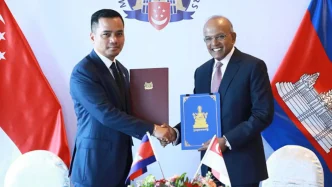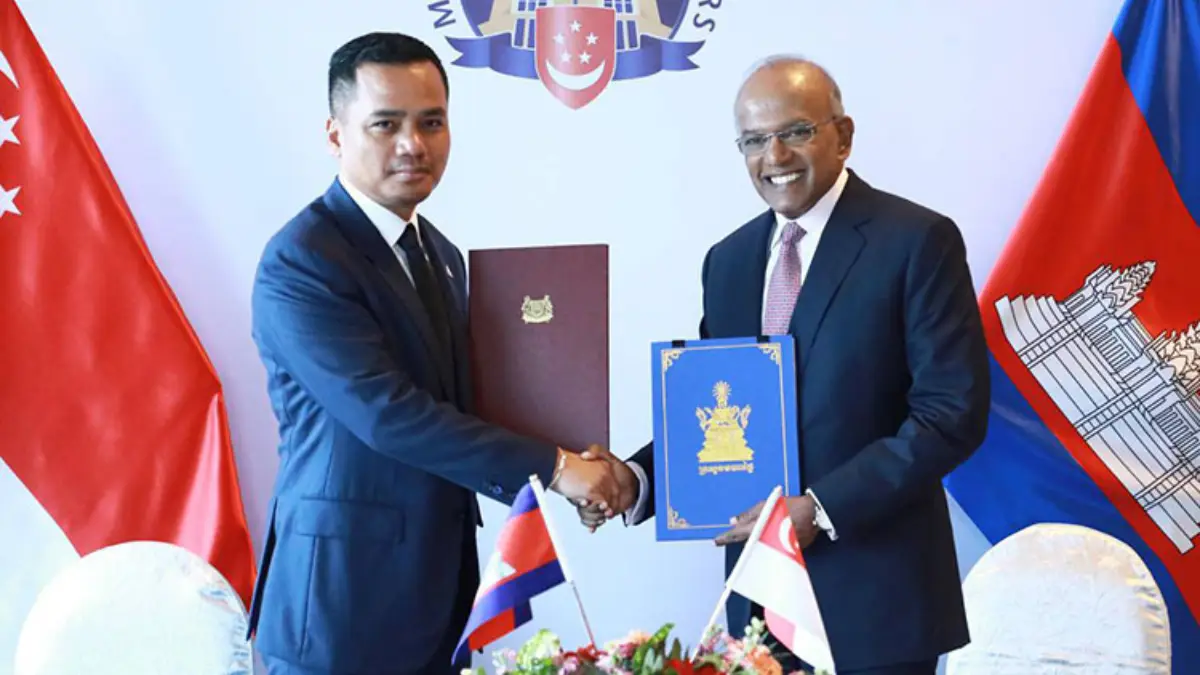In a significant step toward bolstering regional security, Cambodia and Singapore have signed a landmark memorandum of understanding (MoU) to combat transnational crime. The agreement, finalized during a visit by Cambodia’s Interior Minister Sar Sokha to Singapore from July 7 to 9, 2025, targets a range of cross-border threats including terrorism, cybercrime, fraud, drug trafficking, money laundering, and human smuggling. This collaboration underscores the growing complexity of global security challenges and the shared commitment of both nations to safeguard stability within the ASEAN region.
A Strategic Partnership for Regional Security
The MoU was signed between Minister Sar Sokha and Singapore’s Coordinating Minister for National Security, Kasiviswanathan Shanmugam, marking a pivotal moment in bilateral relations. According to a statement from Cambodia’s Interior Ministry on July 9, 2025, the agreement focuses on prevention and enforcement measures to address crimes that undermine public order and citizens’ livelihoods. It also emphasizes the exchange of intelligence on general security situations affecting both national and regional stability.
“During the visit, the two ministers signed a memorandum of understanding on the prevention and fight against cross-border crime, with a continued focus on combating terrorism, cybercrime, fraud, drug-related crimes, money laundering, trafficking, and human smuggling” the ministry’s statement noted. This comprehensive approach reflects the multifaceted nature of modern crime, which often transcends borders and exploits technological advancements.
The timing of this agreement is critical. The ASEAN region faces escalating threats from organized crime networks that operate across jurisdictions, leveraging digital platforms for illicit activities. Cybercrime, in particular, has surged in recent years, with scams and fraud costing millions annually. Drug trafficking and human smuggling also remain persistent challenges, often linked to broader issues of poverty and political instability in parts of Southeast Asia. By aligning their efforts, Cambodia and Singapore aim to set a precedent for regional cooperation in tackling these shared threats.
Strengthening Law Enforcement Through Training and Collaboration
Beyond immediate enforcement, the MoU includes provisions for capacity building and training. Both nations have agreed to support each other in enhancing human resource capabilities within their law enforcement agencies. This focus on professional development is particularly significant for Cambodia, where modernizing police forces and improving technical expertise are ongoing priorities. Singapore, with its advanced infrastructure and expertise in areas like cybercrime prevention, offers a valuable model for such progress.
“The two sides also agreed to continue supporting each other in training and enhancing human resource capacity and to further strengthen cooperation within the regional framework, especially under the ASEAN Mechanism for Combating Transnational Crime” the Interior Ministry’s statement added. This commitment to regional collaboration highlights the broader implications of the agreement, positioning it as a building block for ASEAN-wide initiatives against crime.
Singaporean Prime Minister Lawrence Wong also expressed strong support for these joint efforts, endorsing both the fight against transnational crime and the enhancement of Cambodia’s law enforcement capabilities. His backing signals high-level political will on both sides to ensure the MoU translates into tangible outcomes, rather than remaining a symbolic gesture.
Learning from Singapore’s Security Framework
During his visit, Minister Sokha and his delegation gained firsthand insight into Singapore’s sophisticated security apparatus. They toured the Service SG Center, a centralized hub that streamlines public access to essential services, demonstrating how inter-agency coordination can improve efficiency in governance. This model could inspire similar reforms in Cambodia, where bureaucratic inefficiencies often hinder service delivery.
The delegation also visited the Anti-Scam Command (ASCom), a specialized unit dedicated to combating fraud, particularly technology-based scams. ASCom collaborates with both government and private entities to implement timely interventions and protect citizens from financial losses. Given the rising incidence of online fraud in Cambodia—often linked to international crime syndicates operating from border regions—this exposure to Singapore’s proactive strategies could prove instrumental in shaping future policies.
Additionally, the group toured the Central Narcotics Bureau (CNB), which plays a key role in Singapore’s zero-tolerance approach to drug-related crimes. The CNB combines enforcement with innovative educational programs aimed at fostering a drug-free society. For Cambodia, where drug trafficking remains a significant issue, particularly in border areas, adopting elements of Singapore’s dual focus on suppression and prevention could offer a path forward. The CNB’s emphasis on public awareness campaigns aligns with Cambodia’s need to engage communities in the fight against narcotics.
Broader Implications for ASEAN Security
The Cambodia-Singapore agreement arrives at a time when ASEAN as a whole grapples with the evolving nature of transnational crime. From cyber-attacks disrupting national economies to human trafficking networks exploiting vulnerable populations, the region faces a spectrum of challenges that no single country can address in isolation. This bilateral partnership could serve as a catalyst for wider collaboration, encouraging other ASEAN member states to forge similar agreements and pool resources.
Singapore’s role as a regional leader in security and technology positions it as a natural partner for Cambodia, which is still building its institutional capacity in these areas. The MoU not only strengthens ties between the two nations but also reinforces ASEAN’s collective commitment to combating crime through frameworks like the ASEAN Mechanism for Combating Transnational Crime. This mechanism, established to facilitate information sharing and joint operations, gains further momentum with each bilateral agreement among member states.
However, the success of this partnership will depend on implementation. While the MoU outlines ambitious goals, translating them into actionable policies requires sustained funding, political commitment, and coordination between agencies on both sides. Challenges such as differing legal frameworks, language barriers, and varying levels of technological infrastructure could complicate joint efforts. For Cambodia, addressing internal issues like corruption within law enforcement will also be crucial to ensuring the integrity of collaborative initiatives.
A Step Toward a Safer Region
The agreement between Cambodia and Singapore represents more than a bilateral accord; it is a statement of intent to confront the shared threats that undermine regional stability. By focusing on both immediate enforcement and long-term capacity building, the partnership addresses the root causes and symptoms of transnational crime. It also sets an example for how smaller nations can leverage the expertise of more developed partners to enhance their own security frameworks.
For Cambodia, this collaboration offers an opportunity to modernize its approach to crime prevention, drawing on Singapore’s proven strategies in areas like cybercrime and narcotics control. For Singapore, the agreement reinforces its role as a regional hub for security cooperation, extending its influence in shaping ASEAN’s response to cross-border challenges.
As the two nations move forward with implementing the MoU, questions remain about how quickly results will materialize and whether other ASEAN countries will follow suit with similar partnerships. The evolving nature of transnational crime demands constant adaptation, and the success of this agreement could hinge on the ability of both Cambodia and Singapore to remain agile in the face of new threats. For now, this landmark deal offers a glimmer of hope for a safer, more secure region.
















